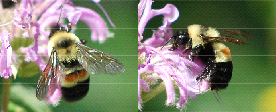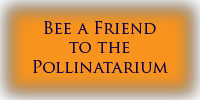BEESPOTTER
BeeSpotter (http://beespotter.mste.uiuc.edu/) is a web-based partnership between citizen-scientists and the professional science community designed to educate people about pollinators by engaging them in an effort to obtain baseline information on the population status of honey bees and bumble bees. Beespotters register and then log in to upload photos they’ve taken; they can try to identify their specimens with the user-friendly color-based keys on the website or leave it for the content master, research specialist Terry Harrison, to identify. Species identity, date and locality are then entered into the database, where they can be cross-referenced by species, location, or collector; moreover, over 7000 historical records of bees from the INHS collection have been entered and can be accessed and cross-checked with contemporary sightings to determine whether ranges have shifted with time.
The site, created by webmaster Michael McKelvey, also includes bee-related topics for visitors who would just like to learn about bees; there’s a guide to photographing bees, bumble bee and honey bee identification keys, “bee-ographies” of Apis mellifera and Illinois’ 11 bumble bee species, descriptions of colony collapse disorder and bumble bee declines, resources for teachers, and instructions on making a bee-friendly garden. In just about 1 year of operation, over 500 citizen scientists from all over the state have uploaded over 1500 photos.
On August, 14, 2008, our website proved its scientific worth in a particularly dramatic fashion. A Beespotter near Peoria, Illinois snapped two unambiguous photographs of a rusty-patched bumble bee, Bombus affinis. This bee, historically known from a wide range of localities throughout eastern North America, has declined precipitously throughout the eastern U.S.; once abundant in Illinois, B. affinis was even thought to be locally extinct. That a citizen-scientist could show conclusively that B. affinis is still around in our state is evidence of the power of having many interested people watching for and caring about bees.


